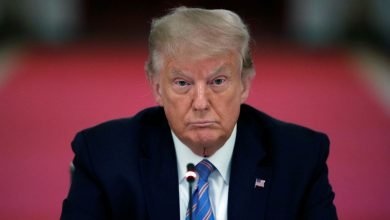How China Wants to Replace the U.S. Order
What began as a trade war and a tech war between Beijing and Washington is now an ideas war.
Beijing has for years been chipping away at the pillars of the U.S.-led global order—subverting its foundational institutions, international norms, and liberal ideals—but Chinese President Xi Jinping had not offered a comprehensive vision of how a China-led replacement might work. That is changing.
Xi has collected his ideas for a new world order into the Global Security Initiative (GSI), a platform of principles on international affairs and diplomacy that, he argues, can make the world a safer place. Included are some proposals that sound appealing—countries should resolve their disputes through dialogue, respect one another’s differences, and be considerate of varying national interests to achieve “security for all,” as Xi put it in an April speech. “We need to work together to maintain peace and stability in the world,” he said. “Countries around the world are like passengers aboard the same ship who share the same destiny.”
Behind the pleasant sentiments is a deeper threat. The initiative might as well be called the Autocrat’s Manifesto. Its principles and practices would usher in a global system friendlier to repressive regimes than the current order, grounded as it is in democratic ideals. The GSI is the latest, and possibly most troubling, evidence that the confrontation between the U.S. and China is escalating into a full-fledged contest for global primacy. What began as a trade war over Beijing’s discriminatory business practices and a tech war to dominate the industries of the future is now an ideas war—a battle to establish the norms that govern global affairs. The U.S. and China are locked in a struggle to define how countries interact, the legitimacy of different forms of governments, the rules of commerce, and the meaning of human rights.
The biden administration has placed defending and strengthening what Washington calls the “rules-based” global order at the center of its Asia policy, to counter Beijing’s threat. “China is the only country with both the intent to reshape the international order and, increasingly, the economic, diplomatic, military, and technological power to do it,” U.S. Secretary of State Antony Blinken said in May. “Beijing’s vision would move us away from the universal values that have sustained so much of the world’s progress over the past 75 years.”
Chinese leaders don’t see things that way. To Beijing, the existing order has become inherently hostile to it and a constraint on its global ambitions. By upholding democracy as the sole legitimate form of government, the system undermines the stature of China’s authoritarian state on the world stage. Worse still, from Beijing’s perspective, it hands undue diplomatic, economic, and ideological leverage to the U.S. and its partners, leaving China vulnerable to sanction and pressure.
“Chinese policy makers believe that the current global order is geared toward U.S. hegemony, that … the world’s greatest power is doing all it can in order to contain and suppress and encircle China,” Tuvia Gering, a research fellow at the Jerusalem Institute for Strategy and Security, told me. “They need to lay the infrastructure for a more China-centric, or at least a less U.S.-, Western-centric, world.”
Beijing’s agenda is also shaped by its narrative of inevitable U.S. decline and Chinese ascent. Washington and Western democracies more broadly have become incapable of leading the world, China says—typified, in Beijing’s eyes, by their failed response to the coronavirus pandemic. China, and specifically Xi, whom Beijing markets as a master theorist, can provide new solutions. Foreign Minister Wang Yi, in an April essay, wrote that the GSI “contributes China’s wisdom to the efforts of mankind” and “China’s solution to addressing international security challenges.”
“The world is starting to fall apart,” Wang Huiyao, the president of the Center for China and Globalization (CCG), a Beijing-based think tank, told me. “China, being one of the largest stakeholders of this global system, felt there’s a need, there is an urgency, to propose some kind of security recommendations and initiatives” in order to “start a constructive dialogue on this issue” and “minimize the risk of the [world] falling into another catastrophe.”
Xi was probably prompted to unveil the GSI by the war in Ukraine, which encapsulates Beijing’s concerns about the U.S.-led order. From one angle, the war bolsters the Chinese narrative that the current system is in chaos, and Washington is responsible. (Beijing blames NATO expansion for the conflict.) Yet the American response—ferrying arms and intelligence to Kyiv while imposing an array of sanctions on Russia—also deepened Chinese fears that Washington could turn the global order against them.
It makes sense, then, that one of the GSI’s key tenets is opposition to “unilateral” sanctions. That idea is not necessarily new: Xi and his diplomats have been pitching it, like others in the GSI, for years. By bringing them together under the banner of the GSI, Beijing now has a framework it can sell.
But while Beijing presents the GSI as a selfless endeavor for the global good, many of its planks, such as the one about sanctions, are also self-serving. Among those Xi outlined in a speech at this year’s Boao Forum in China’s Hainan province is “respecting the sovereignty and territorial integrity of all countries,” which backs Beijing’s claim to Taiwan. Another, “uphold noninterference in internal affairs,” is a way of silencing Washington’s criticism of Beijing’s ill-treatment of minority Uyghurs or Hong Kong democracy advocates. “Respect the independent choices of development paths and social systems made by people in different countries” grants autocracy the same legitimacy as democracy. “Say no to group politics and bloc confrontation” protests against the U.S. alliance system.
Many of the GSI’s points—though they don’t specifically mention the U.S.—target the tools of American influence, including economic sanctions and Washington’s preference for collective action. “China, of course, doesn’t really like what the U.S. is unilaterally doing,” said the CCG’s Wang, who then ticked off a list that included promoting the Quad, an Asia-centered security partnership, and providing nuclear-submarine technology to Australia. China’s position, according to Wang, is that “security is a comprehensive thing. You cannot just think about your security [and] not think about my security. We should think about security together.”
For some world leaders—especially the autocratic sort—the GSI may be appealing. Many would prefer to be free of American standards of human rights and democracy, and Washington’s preaching and pressure to adhere to them. In China’s version of a world order, national leaders are allowed to do more or less as they please within their own borders. The GSI thus has the potential to become the ideological backbone of an alternative, China-led system that brings together illiberal states in opposition to the U.S.
Yet Beijing also intends to co-opt elements of the current order and repurpose them to promote its own ideals and interests—most notably the United Nations, where the Chinese have already worked hard to promote their political principles. The GSI wraps itself in the UN mantle by advocating that countries uphold the institution’s charter. In this way, China tries to present itself as the defender of the international order. Foreign Minister Wang, in his essay, very obviously refers to the U.S. when he criticizes “fake multilateralism” based on “gang rules” in contrast with China, whose GSI is “rooted in true multilateralism.”
It’s hard to understand how the GSI is a practical proposal, at least in its current form. Although the Chinese present it as a “complete system,” the GSI is more a vague statement of principles and appears to be a work in progress. Some of its tenets seem simply unworkable. Take, for instance, “oppose the pursuit of one’s own security at the cost of others’ security.” Though it sounds like a great idea, this runs contrary to the fundamental responsibility of modern nation-states (including China) to defend their citizens against outside threats and promote their prosperity. Xi’s GSI offers no criteria or mechanism to sort out such competing national interests when they inevitably conflict, either.
Like all great powers (including the U.S.), China is more interested in setting rules than following them. The GSI derides “unilateral sanctions” even as Beijing imposes them on Australia and Lithuania to pressure those countries into policies more favorable to China. The GSI criticizes the formation of “blocs,” but Beijing is striving to forge its own—most notably, a partnership with Russia. Wang, the foreign minister, has racked up frequent-flier miles parading around the South Pacific, trying to woo island nations into a China-led security and economic pact.
No issue better exposes the contradictions of Xi’s initiative than China’s stance on Ukraine. Though the GSI stresses the importance of territorial integrity, Beijing has paid no more than lip service in defense of Ukraine’s, standing by its friends in Moscow as their army dismantles it, and then justifying its support for Russia’s position with another GSI plank: “taking the legitimate security concerns of all countries seriously.” It will come as little surprise that Vladimir Putin gave a thumbs-up to the GSI during a recent conversation with Xi, according to China’s foreign ministry.
How far Xi can get with the GSI is therefore unclear. Beijing’s challenge will be to convince other countries that they would not simply be replacing American hegemony with China’s. The Chinese, though, believe that time is on their side. As their power grows, their voice in global affairs will become more important, along with the import of their ideas.
More likely, the GSI could be part of the ideological foundation of a new Sino-centric sphere, composed mainly of illiberal states and Chinese clients. The U.S. and many other democratic societies seem highly unlikely to endorse Beijing’s principles, thereby splitting the current world order rather than replacing it.
The world that Beijing and the GSI envision is one where there is, in effect, no international community—where repressive regimes such as China’s can abuse their citizens as harshly as they choose and coldly pursue national goals, as Putin does in Ukraine, while other countries look the other way. The U.S.-led order certainly has its problems. The Chinese substitute would be the problem.




